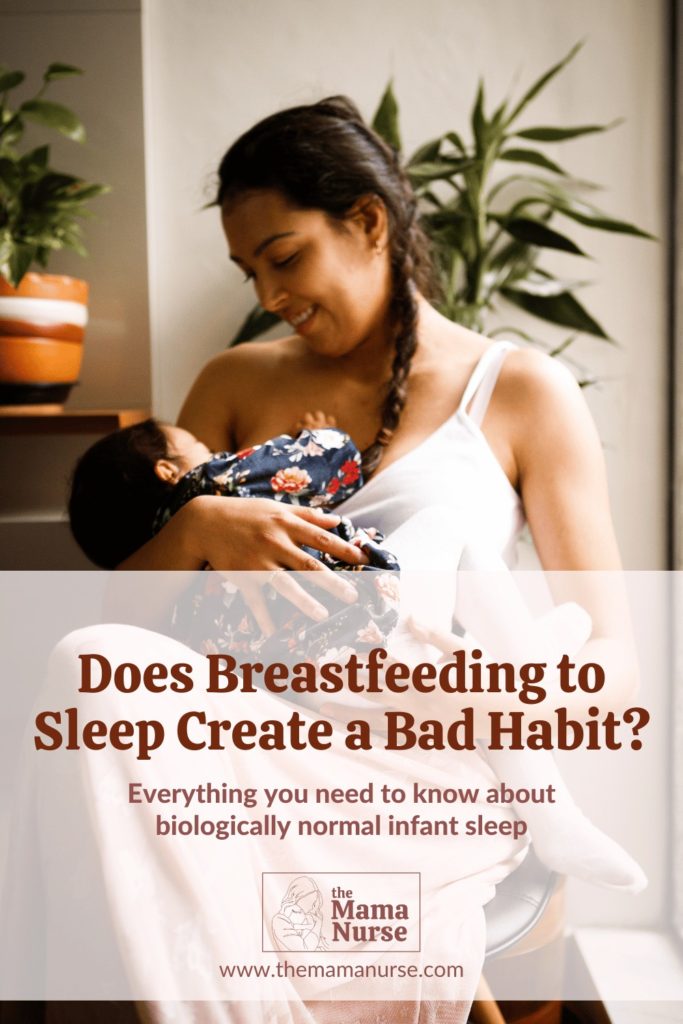Have you heard that breastfeeding to sleep will cause your baby to become overly dependent and wake more frequently through the night? Our society thrusts this fear upon new parents, almost right from birth. It negatively impacts the breastfeeding relationship, impedes our ability to attune to our baby’s needs, and causes unnecessary stress. I work with many parents who feel certain that they are creating bad habits by nursing to sleep. There is often a lot of guilt and shame tied to this fear. Parents worry that they are somehow injuring their babies by not teaching them how to “self-soothe”.
As a mom of 4, nurse psychotherapist, lactation consultant, and baby-led sleep specialist, this topic is very near and dear to my heart. I believe that you deserve to know the truth: Breastfeeding to sleep is something to be enjoyed by you and your baby. Breastfeeding provides the nourishment, connection, warmth, and safety that all babies need to thrive. Breastfeeding is also the easiest way for you to provide this all at once. There is absolutely nothing bad about it.
The Science of Sleep
Sleep is biologically driven and reliant on two body processes:
- Our circadian rhythm, which helps us discern between night and day
- Our sleep/wake homeostasis regulates our wakefulness and sleep pressure
These are the two sleep mechanisms at work for your baby – the time of day, and the length of time awake between sleep. All babies wake up between sleep cycles. There is nothing inherently wrong with this. If this was the case, every baby would be considered to have a sleep disorder. It is also very normal for these sleep cycles to shift as your baby grows.
Some babies fully rouse and signal when they wake up, while other babies settle more easily. Personality, temperament, discomforts (teething pain, reflux, hunger, etc), and developmental milestones impact how often your baby needs to be resettled. Much of what determines this is out of your control as a parent. The one thing we can rely on is that a baby’s sleep pattern is always changing! Sleep patterns fluctuate throughout the first year of life and beyond. What we can control is our emotional availability at bedtime and through the night. This study, for example, demonstrated that increased maternal emotional availability significantly increased the duration of sleep for the infant from 0-6 months of age.
The Importance of Attunement
We also know that babies are born immature when compared to other mammals – that’s where the 4th trimester comes in. From an evolutionary standpoint, the cause of this immaturity at birth is due to the narrowing of our pelvic outlet as we as humans learned to walk on two feet. This reduction in pelvic outlet size increases the maternal risk when birthing larger, more fully developed babies. Newborn babies fully rely on parents to keep them warm, safe and fed. The only way for a baby to communicate is through nonverbal cues and eventually crying.
Attunement is a very important process where parents learn to consistently respond to their baby’s cues, creating emotional synchronicity. This can include mirroring (smiling back at the baby), as well as cross-modal (validating the baby’s experience in different ways). Mother-infant attunement has been shown to help develop emotional regulatory skills through co-regulation. Perinatal mental health conditions can make attuning to a baby’s needs more difficult. Breastfeeding to sleep is one way that moms can provide this attunement on a consistent basis.
Do I Need to Train My Baby to Sleep?
Sleep is not something we should teach our babies how to do. There are a lot of articles online that tell parents that babies need to be trained to sleep longer stretches. In actuality, babies already know how to sleep.
They just spent 9 months in the womb sleeping off and on, waking when they feel like it, and nodding off when they’re ready. Our babies have an innate need to be connected, safe, warm & loved. This is why they wake for us at night, not because we are spoiling them or creating bad habits. By responding to their needs day and night, we are building up these mirror neurons, encouraging them to maintain their authenticity while becoming securely attached to us. It helps them believe that their needs matter and that the world is a safe and loving place.
Babies don’t need to be trained to connect sleep cycles. This will happen when they are developmentally ready to do so, as long as there are no medical issues present that can affect sleep. I do believe we can help our babies learn to settle to sleep in a crib if wanted. However, this should never involve harsh sleep training practices that disrupt the parent-infant bond. Sleep training involving a baby left to cry alone ends up “working” because the baby stops signaling for the parent, not because they “learned” how to fall asleep.
Is Breastfeeding to Sleep a Bad Habit?
Breastfeeding to sleep is not a bad habit. It’s a positive sleep association that is often the easiest way to help your baby fall asleep. Your breasts are the original pacifier, and frequent milk removal makes sure your milk supply stays where it needs to be. Our breasts were magically made to produce milk containing the sleep hormone tryptophan! Breastfeeding helps you & your baby fall asleep easier – why would we try to go against nature?
I believe that any sleep association that helps your baby fall asleep in a calm state should be considered a “positive” sleep association. I encourage the clients I work with to lean into their baby’s needs rather than try to change their baby’s behaviour. By doing this alone, a lot of sleep “problems” can naturally disappear. Sometimes, this also includes doing some self-inquiry about why getting your baby to sleep through the night is at the forefront. It can be helpful to ask yourself the following questions:
- Are you feeling pressure from the internet, social media, family members, friends, or other acquaintances?
- How does your baby’s sleep pattern impact how you see yourself as a parent?
- How are you feeling overall in your motherhood journey? Are you feeling out of control?
- Are you & your partner on the same page with sleep practices?
- Are there supports available that you can outsource?
Will Removing Nursing From Our Bedtime Routine Help Us Get More Sleep?
Most likely not. Babies don’t typically like to make this change before they are ready. Also, the time you would spend stressing about removing breastfeeding to sleep would be much better spent soaking in baby snuggles. The first year honestly goes by so fast. I know everyone tells you that, but it really does! As a mom of four, I found I was able to relax a bit more with each baby.
Somewhere between 6-12 months, many babies start to not fall asleep during nursing sessions at least occasionally. These are the times at which you can practice giving your baby more space to settle in the crib while remaining in the room with them to help them fall asleep. There is no need to use separation-based sleep support to do this. We can think of developing separation with sleep like an intuitive dance with our children – when we sense that they need some space to settle themselves, we can provide that to them. When they need us more, we can trust that they know what their body needs more than we do, and we can offer them that co-regulation to settle to sleep in our arms or beside us while laying down.
If breastfeeding before bed and nap times is stopped, your baby most likely will be upset. It may seem like you are making progress in the beginning, but it doesn’t tend to last long. Once your baby ends up getting sick or is going through something else, he/she will want to (understandably) be nursed to sleep. In my experience, many parents who end up moving the nursing session earlier in their bedtime routine end up with a baby with the same number of wakings through the night.
Other Important Info About Nursing to Sleep
Here are a few more things to be mindful of if you choose to not breastfeed your baby to sleep:
- Reducing, restricting, or timing nursing sessions has the potential to reduce your milk supply. Your milk supply is maintained by supply and demand. The less you nurse, the less milk you will make.
- If your baby becomes dysregulated and becomes stressed, increased cortisol levels (stress hormone) will make it more challenging for your baby to fall asleep.
- Be prepared to spend more time settling your baby to sleep when using other comfort measures. Nursing is often the fastest, easiest way to support babies back to sleep in the middle of the night.
If this is a change you want to make, I recommend doing so after the 12-month mark. I highly recommend avoiding the separation anxiety stage between 8-12 months.
This isn’t to say that you can’t make changes! I definitely support families to make parent-led sleep changes when sleep associations aren’t sustainable anymore. We just always need to balance our awareness of biologically normal infant development with parents’ needs for sleep & well-being.
If you are interested in learning how to night-wean when the appropriate time comes, you can check out the Isla Grace night-weaning course (affiliate link – you get $15 USD off). Isla Grace is the program that I used to become certified as a Baby-Led Sleep & Well-Being Specialist. While I currently am not accepting any sleep clients, I found this certification invaluable in my practice with parents as a nurse psychotherapist. Lauren Hefferton, creator of this certification program, does a great job explaining biological nurturing and attachment in a way that makes sense to professionals and parents alike.






Thank you for offering evidence-based advice that supports baby’s biological norms! Love it!